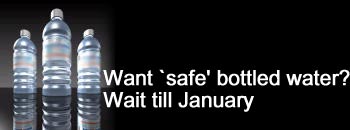Home > Business > Special
Ehtasham Khan in New Delhi |
August 08, 2003

The debate over pesticide-laced bottled soft drinks -- as also packaged drinking water -- is raging, but it seems consumers will have to wait till January before they get 'safe' packaged drinking water.
The new norms regulating the safety of bottled water will come into force from January, 2004.
The Ministry of Health and Family Welfare released a notification in July laying down the quality standards to be followed by the manufacturers of packaged drinking water.
Also Read:
The Cola Row: Soft drinks, hard truths
Watch before you drink that water!
The government has given the manufacturers time till January to improve their technology.
Non-governmental organisation Centre for Science and Environment had in February showed that 17 leading brands like Bisleri, Kinley and Aquaplus sold in Mumbai and Delhi contained toxic material.
The new regulation is said to be another feather in the cap of CSE that this week found pesticides in soft drinks manufactured by PepsiCo and Coca-Cola.
According to the new rule for packaged drinking water, pesticide residues considered individually should be 0.0001 mg/litre and the total pesticide residues should be 0.0005 mg/litre. The manufacturer should also have a "No Objection Certificate" from the Central or State government.
Wajahat Habibullah, secretary to the department of consumer affairs, told rediff.com: "As of now, we are following the old safety norms. Quality that was prescribed earlier. The new regulations will come into effect from January."
"Meanwhile, we are conducting inspections in the manufacturing units regularly. We stopped production of many of the plants that were not conforming to our quality standards. They were restored only after meeting the required norms."
CSE had found pesticides residues in raw samples that were the source of water for various manufacturers.
Treatment technology given to the raw water was not sufficient for removal of pesticides.
The entire portion of water was not subjected to reverse osmosis, the CSE report said.
The samples, said the CSE report had enough toxins to cause, in the long term, cancer, liver and kidney damage, disorders of the nervous system, birth defects, and disruption of the immune system. Pesticides do not kill immediately, but can cause irreparable health disorders as they accumulate in the body fat.
The four most commonly found pesticide residues were lindane, DDT, malathion and chlorpyrifos.
Using European Economic Commission norms for maximum permissible limits for pesticides in packaged water, the CSE lab tests of samples from the Delhi region showed that on average, each sample contained 36.4 times more pesticides than the stipulated levels.
Government came into action after the CSE report created furore in the public and media in February.
This forced the government to take action on it.
The Bureau of Indian Standard, a unit of Ministry of Consumer Affairs, Food and Public Distribution that regulates and monitors the quality standards of such consumer products, had accepted that it lacked monitoring mechanism to maintain international quality standards.
It had suggested new norms for bottled water similar to what was recommended by CSE.
Chandra Bhushan, who is working on packaged drinking water at CSE, said: "We are happy that all our recommendations for the quality control of bottled water has been accepted by the government."
"But we will be in a position to comment on it only after January. We will have to see the implemented part," said Bhushan.
Said Habibullah: "They will be liable for legal action for non-implementation of the regulations."
Bhushan expressed his happiness that at least "something is happening."
"Earlier nobody was bothered."
"The problem was not of technology. The problem was of intent. Most of the plants have the technology but were not working on it," said Bhushan.
He said CSE has not checked the bottled water after its expose in February.
"I don't know what is the quality of water available in the market now. We are a small organisation. We don't have so much of resources. It is up to the government to monitor the products.
"But unfortunately they also don't have the mechanism that matches international standards," said Bhushan.
"Let us see what happens after January. We will definitely follow it up."
An official of the BIS said all the companies were following the quality norms currently in force.
He said: "Some are even following the latest regulations. Leading brands are equipped with such technology. There has been a lot of improvement."
"But for all the manufacturers, it will take some time," the official said.